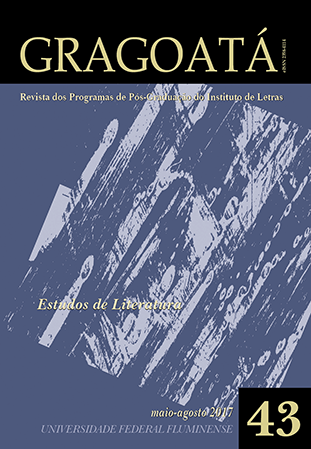A condicionante exógena e a homogeneização cultural: reflexões sobre a formação do cânone em Moçambique
DOI :
https://doi.org/10.22409/gragoata.v22i43.33502Mots-clés :
Cânone. Literatura. Moçambique.Résumé
O propósito desta pesquisa é problematizar a formação do cânone literário em Moçambique, investigando que processos concorrem para sua constituição e de que lugar teórico opinam os críticos que o determinam. Após discorrer sobre estas questões – quem define o cânone e em que fatores se baseia –, procuraremos analisar instâncias específicas relativas à constituição da moçambicanidade como elemento de consolidação literária interna. Dentre elas, verificaremos a recorrência de temáticas de cunho essencialista e a consequente representação de uma pseudo homogeneização cultural praticada no país africano. A fim de respaldar nosso estudo, nos apoiaremos nos estudos teóricos de Appiah (1997), Bhabha (1998), Mbembe (2014), Anderson (2008), Leite (2012, 2014) e Martinho (2001), entre outros.
---
DOI: http://dx.doi.org/10.22409/gragoata.2017n43a932.
Téléchargements
Téléchargements
Publiée
Numéro
Rubrique
Licence
AUTORIZAÇÃO
Autores que publicam em Gragoatá concordam com os seguintes termos:
Os autores mantêm os direitos e cedem à revista o direito à primeira publicação, simultaneamente submetido a uma licença Creative Commons Atribuição 4.0 Internacional (CC BY 4.0), que permite o compartilhamento por terceiros com a devida menção ao autor e à primeira publicação pela Gragoatá.
Os autores podem entrar em acordos contratuais adicionais e separados para a distribuição não exclusiva da versão publicada da obra (por exemplo, postá-la em um repositório institucional ou publicá-la em um livro), com o reconhecimento de sua publicação inicial na Gragoatá.
A Gragoatá utiliza uma Licença Creative Commons - Atribuição CC BY 4.0 Internacional.











